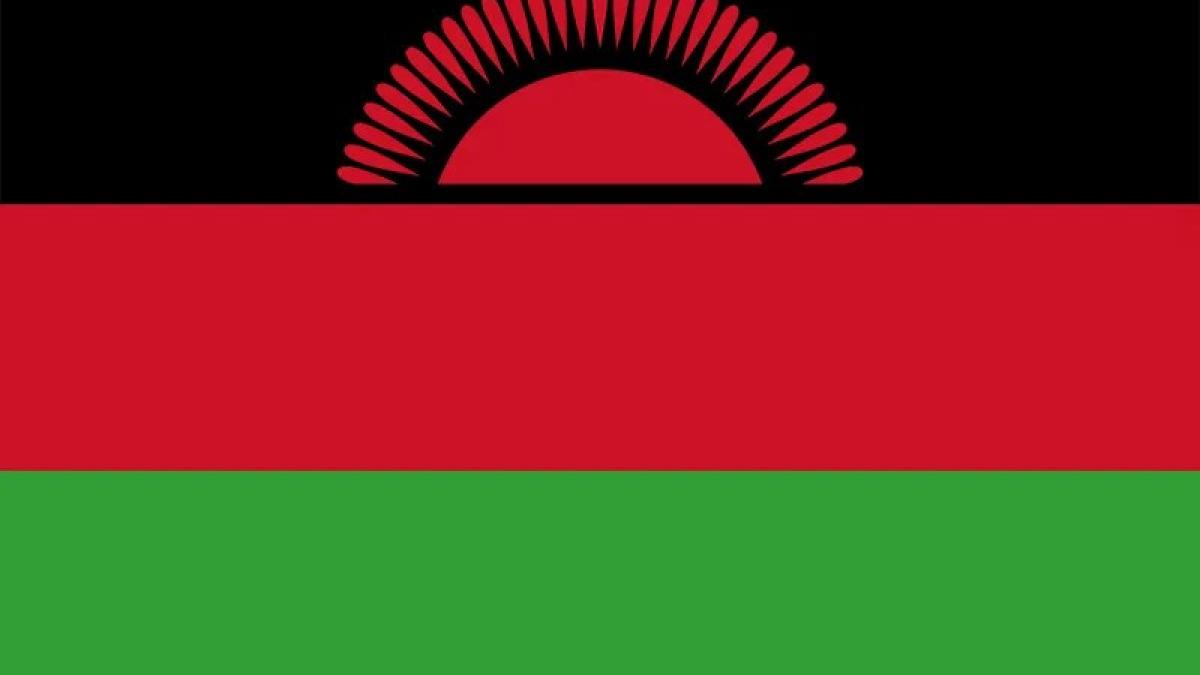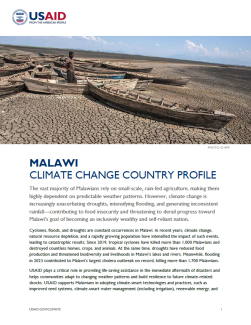Cyclones, floods, and droughts are constant occurrences in Malawi. In recent years, climate change, natural resource depletion, and a rapidly growing population have intensified the impact of such events, leading to catastrophic results. Since 2019, tropical cyclones have killed more than 1,000 Malawians and destroyed countless homes, crops, and animals. At the same time, droughts have reduced food production and threatened biodiversity and livelihoods in Malawi’s lakes and rivers. Meanwhile, flooding in 2023 contributed to Malawi’s largest cholera outbreak on record, killing more than 1,700 Malawians.
USAID plays a critical role in providing life-saving assistance in the immediate aftermath of disasters and helps communities adapt to changing weather patterns and build resilience to future climate-related shocks. USAID supports Malawians in adopting climate-smart technologies and practices, such as improved seed systems, climate-smart water management (including irrigation), renewable energy, and improved natural resource management. USAID also partners with the Government of Malawi to accelerate the country’s transition to renewable energy and promote enabling policies for market-led climate-smart solutions.
Government of Malawi Climate Priorities
Malawi is a party to the United Nations Framework Convention on Climate Change (UNFCCC), and the Government of Malawi is committed to taking urgent action to mitigate and adapt to climate change. The country has several strategies that articulate the country’s climate priorities, including Malawi 2063, which highlights environmental sustainability as one of the cross-cutting enablers required to achieve a more inclusive, wealthy, and self-reliant nation. Meanwhile, Malawi’s National Climate Change Management Policy, adopted in 2016, provides strategic direction on integrating climate change into development planning through adaptation, mitigation, technology development and transfer, and climate finance. In 2021, Malawi also developed a National Adaptation Plan Framework to align efforts to address climate change, with an overarching goal of reducing communities’ and ecosystems’ vulnerability to the effects of climate change through adaptation and mitigation, technology transfer, and capacity building. Malawi’s Nationally Determined Contribution (NDC) commits to a combined unconditional and conditional contribution of 51 percent reduction in GHG emissions by 2040 coming from the energy, agricultural, waste, and industrial sectors. The NDC also identifies ten strategic adaptation actions across three pillars: (1) institutional framework; (2) knowledge, technology, and financing; and (3) resilience of the most vulnerable.
USAID’s Climate Change Program: Objectives and Results
USAID takes an integrated approach to addressing climate change, leveraging programming across all sectors to contribute to shared priorities of adaptation, renewable energy, and climate-smart solutions. USAID interventions strengthen local governance to achieve more resilient communities and systems and advance a more inclusive private sector that drives adaptation and diversification and lays the foundation for more sustainable and climate-smart agriculture. Additionally, USAID’s programs promote resilience among youth and vulnerable populations through workforce development programs that increase livelihood opportunities and build the capacity needed to create a greener economy.
Adaptation
In partnership with the Government of Malawi, the private sector, civil society, and think tanks, USAID supports vulnerable communities’ efforts to adapt to more frequent weather-related shocks and helps foster more resilient landscapes, infrastructure, health systems, and agricultural practices. USAID supports the government of Malawi in operationalizing its resilience-building strategies and plans, such as the National Resilience Strategy, the National Forest Landscape Restoration Strategy, and the National Charcoal Strategy.
Key Results
USAID has helped:
- Diversify natural resource-based enterprises (including forestry, fisheries, and agriculture);
- Upscale the use of climate-resilient crops, high-yielding short-season seeds, climate-smart agricultural practices, and new technologies to boost yields and improve water and soil management;
- Widen the adoption of sustainable watershed management practices, assisted natural regeneration, and reforestation while diversifying livelihoods; and
- Reduce soil loss through soil and water engineering structures such as vegetated drainage ways, water diversion, swales, check dams, and gully reclamation.
Renewable Energy
Through Power Africa, USAID provides technical assistance and transaction advisory services that boost the production and transmission of clean energy. USAID supports decentralized power systems—such as mini-grids, off-grid solar-powered health clinics, pharmacy-in-a-box systems, and solar home systems—that provide renewable electricity to populations not connected to the national grid.
Key Results
USAID has helped:
- Provide transaction advisory services to the Government of Malawi on the development of the 361 megawatts (MW) Mpatamanga Hydropower Project, which forms part of USAID/Power Africa Southern Africa Energy Program and has the potential to double the country’s generation capacity;
- Mobilize more than $15 million of public-private finance to support the $1.3 billion Mpatamanga hydropower project; and
- Expand Malawi’s capacity to operate the Mozambique-Malawi regional interconnection system
Natural Climate Solutions
USAID supports the implementation of Malawi’s Reducing Emissions from Deforestation and Forest Degradation (REDD+) and the NDC programs. Through their engagement and leadership in the donor space, USAID and the U.S. Department of State support the Government of Malawi’s climate ambitions.
Key Results
USAID has helped:
- Strengthen enforcement of forestry and fisheries regulations through capacity building for prosecutors and magistrates while harmonizing sentencing guidelines for forestry and nature-based crimes;
- Support the development of the National Forest Inventory, which culminated in the creation of the National REDD+ Strategy; USAID also supported the Government of Malawi to update its NDC in 2021, which advances REDD+ and Carbon Project Development;
- Institutionalize the National Greenhouse Gases Inventory Management System, which helped shape the development of Malawi’s Third National Communication and first Biennial Update Report to the Conference of the Parties of the UNFCCC;
- Establish the National Forest Monitoring Unit to assess and monitor changes in biomass stocks and forest cover while supporting micro-, small-, and medium-enterprises that promote alternative energy and fuel-efficient technologies in both urban and rural areas; and
- Advance landscape restoration and carbon sequestration initiatives, which addressed deforestation and forest degradation.
For More Information




